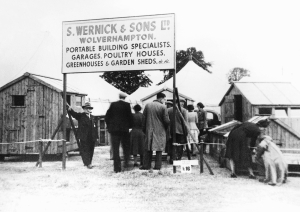Wernick Group proudly announces its 90th anniversary, marking a significant milestone in the company’s rich history of delivering innovative and sustainable modular solutions.
The Wernick Group of companies has a proud legacy stretching back to 1934, growing from a humble maker of poultry crates to becoming Britain’s largest family-owned provider of portable and modular buildings, and off-grid power solutions.
Since its founding, the business has been at the forefront of the modular building industry. Whilst maintaining an enduring status as a family-owned and run business over the past nine decades, Wernick continues its mission to improve people’s lives through the provision of sustainable buildings and infrastructure.
 CEO Jonathan Wernick, commented, “Samuel Wernick, my great-grandfather, started his working life as a poultry dealer. He manufactured wooden crates to transport the chickens which led him to start manufacturing as a commercial enterprise. It was Sam’s ability to adapt to the opportunity of manufacturing these crates that led to the birth of the Wernick Group a few years later. This ability to adapt quickly to opportunities remains one of the key strengths of the Wernick Group 90 years later. He would be immensely proud of everything the company has achieved over that time.
CEO Jonathan Wernick, commented, “Samuel Wernick, my great-grandfather, started his working life as a poultry dealer. He manufactured wooden crates to transport the chickens which led him to start manufacturing as a commercial enterprise. It was Sam’s ability to adapt to the opportunity of manufacturing these crates that led to the birth of the Wernick Group a few years later. This ability to adapt quickly to opportunities remains one of the key strengths of the Wernick Group 90 years later. He would be immensely proud of everything the company has achieved over that time.
Today, the Wernick Group consists of six distinct businesses: Wernick Buildings, Wernick Hire, Wernick Refurbished Buildings, Wernick Events, Wernick AVDanzer, and Wernick Power Solutions. Each company within the group holds focal importance in delivering comprehensive and tailored solutions to meet the evolving needs of its clients.
The last decade, in particular, has seen a vigorous expansion through a combination of shrewd acquisitions and organic growth. The Wernick Group currently has forty operating centres throughout the UK, working across both the public and private sectors. The Group of companies combine to offer the sale and hire of permanent and temporary modular buildings, site accommodation, and off-grid power solutions.
Wernick Group’s Chairman David Wernick commented, “We are a 4th generation company with my son Jonathan running the Group as CEO. We take great pride in what we’ve achieved over the last 90 years and are incredibly grateful for the dedication of our employees during this period.”







